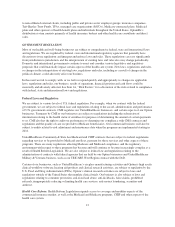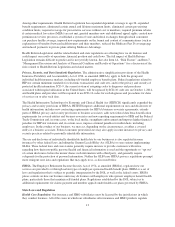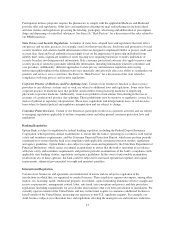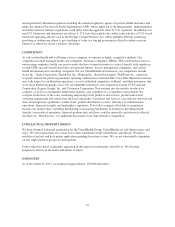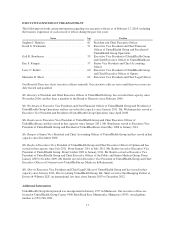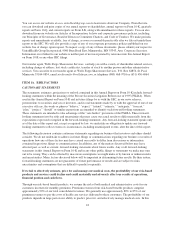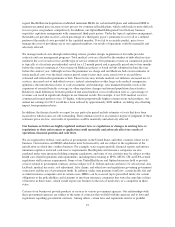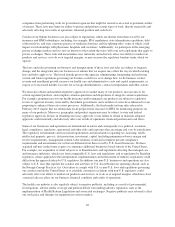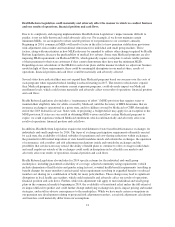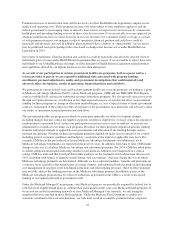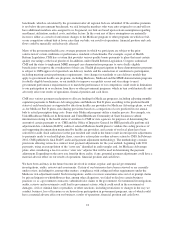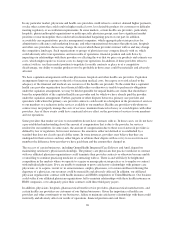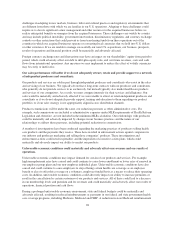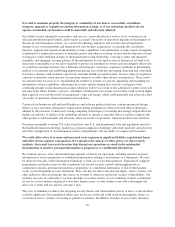United Healthcare 2013 Annual Report Download - page 22
Download and view the complete annual report
Please find page 22 of the 2013 United Healthcare annual report below. You can navigate through the pages in the report by either clicking on the pages listed below, or by using the keyword search tool below to find specific information within the annual report.companies from performing work for government agencies that might be viewed as an actual or potential conflict
of interest. These laws may limit our ability to pursue and perform certain types of work, thereby materially and
adversely affecting our results of operations, financial position and cash flows.
Certain of our Optum businesses are also subject to regulations, which are distinct from those faced by our
insurance and HMO subsidiaries, including, for example, FDA regulations, state telemedicine regulations, debt
collection laws, and state corporate practice of medicine doctrines and fee-splitting rules, some of which could
impact our relationships with physicians, hospitals and customers. Additionally, we participate in the emerging
private exchange markets and it is not yet known to what extent the states will issue new regulations that apply to
private exchanges. These risks and uncertainties may materially and adversely affect our ability to market our
products and services, or to do so at targeted margins, or may increase the regulatory burdens under which we
operate.
The laws and rules governing our business and interpretations of those laws and rules are subject to frequent
change, and the integration into our businesses of entities that we acquire may affect the way in which existing
laws and rules apply to us. The broad latitude given to the agencies administering, interpreting and enforcing
current and future regulations governing our business could force us to change how we do business, restrict
revenue and enrollment growth, increase our health care and administrative costs and capital requirements, or
expose us to increased liability in courts for coverage determinations, contract interpretation and other actions.
We must also obtain and maintain regulatory approvals to market many of our products, increase prices for
certain regulated products, and complete certain acquisitions and dispositions or integrate certain acquisitions.
For example, premium rates for our health insurance and/or managed care products are subject to regulatory
review or approval in many states and by the federal government, and a number of states have enhanced (or are
proposing to enhance) their rate review processes. Additionally, the final market reform rules released in
February 2013 require that we submit data on all proposed rate increases to HHS for monitoring purposes on
many of our products. Moreover, geographic and product expansions may be subject to state and federal
regulatory approvals. Delays in obtaining necessary approvals or our failure to obtain or maintain adequate
approvals could materially and adversely affect our results of operations, financial position and cash flows.
Some of our businesses and operations are international in nature and consequently face political, economic,
legal, compliance, regulatory, operational and other risks and exposures that are unique and vary by jurisdiction.
The regulatory environments and associated requirements and uncertainties regarding tax, licensing, tariffs,
intellectual property, privacy, data protection, investment, capital (including minimum solvency margin and
reserve requirements), management control, labor relations, fraud and corruption present compliance
requirements and uncertainties for us that are different from those faced by U.S.-based businesses. We have
acquired and may in the future acquire or commence additional businesses based outside of the United States.
For example, our acquisition of Amil subjects us to Brazilian laws and regulations affecting the managed care
and insurance industries, which vary from comparable U.S. laws and regulations, and to regulation by Brazilian
regulators, whose approach to the interpretation, implementation and enforcement of industry regulations could
differ from the approach taken by U.S. regulators. In addition, our non-U.S. businesses and operations are also
subject to U.S. laws that regulate the conduct and activities of U.S.-based businesses operating abroad, such as
the Foreign Corrupt Practices Act. Our failure to comply with U.S. or non-U.S. laws and regulations governing
our conduct outside the United States or to establish constructive relations with non-U.S. regulators could
adversely affect our ability to market our products and services, or to do so at targeted margins, which may have
a material adverse effect on our business, financial condition and results of operations.
The health care industry is also regularly subject to negative publicity, including as a result of governmental
investigations, adverse media coverage and political debate surrounding industry regulation, such as the
implementation of Health Reform Legislation and associated exchanges. Negative publicity may adversely affect
our stock price and damage our reputation in various markets.
20




